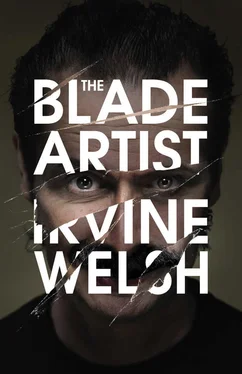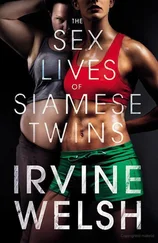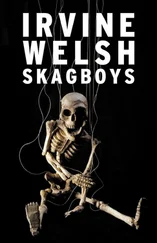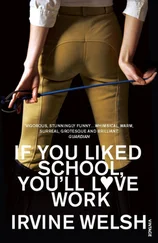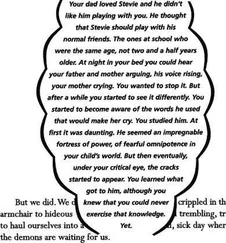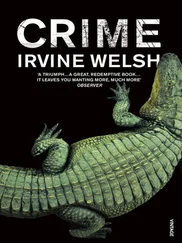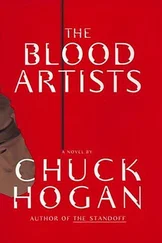— Who the fuck are you?
Franco swivels and holds the ashtray up to the light. He seems at pains to see something through the blue glass. — The weight in these things. His eyes swivel round at Fallon.
Fallon gasps, looking at the ashtray, then into Frank Begbie’s 200-yard stare. — Please. . I don’t want any trouble. . what do you want. .?
— You rented a flat to Sean Begbie, Franco repeats, slapping the ashtray against his open palm.
— No. . no. . I rented to Arbie. . I didn’t know he sublet to Sean or anybody else!
Another name. Arbie . — So you knew Sean?
— Vaguely. . through Arbie and a few others. . they hung around together.
Franco’s eyes blaze, but to Ross Fallon they seem set deep in cavernous slits. It’s like two oncoming trains in adjacent railway tunnels. Then Begbie’s voice drops, almost to a whisper. — Were ye shaggin him?
Fallon looks scandalised. — No, he yelps, then slips into a confessional tone. — I’ve had boys here, for parties. Mostly it was harmless, but they took the piss, stealing and stuff. I was stupid. . I was lonely –
— Ah couldnae gie a fuck how lonely ye wir!
— Sean and I never — honestly!
Franco considers this. There is probably no real reason for him to lie. — Frances Flanagan, she was here, aye?
— Yes.
— Anton Miller?
Fallon visibly trembles at the mention of that name.
— Okay, I’ll take that as a yes, Franco spits, — What about this Arbie gadge, where does he live?
— Gorgie. He just got out of prison.
— Give me his address. Dinnae even think aboot tippin him off or I’ll be back here. Franco lowers the ashtray onto the table. He looks out the window, then rubs the curtains between thumb and finger, talking in detached, matter-of-fact tones, as if he’s addressing the material in his hand. — They will be able to put your face back together again after I’m done, he suddenly whips his neck round, his cold eyes evaluating the landlord, — but it’ll be a long and painful process and it’ll never look quite the same again, and his brows raise skyward, as if actually estimating the extent of the task the surgeon will have.
Fallon’s trembling hand picks up a pen and scratches out the address in capital letters on a notepad. He tears off the page and hands it to Frank Begbie. The address seems familiar.
It takes Franco over an hour to get to Gorgie, through the heavy traffic. Then he is astonished to find himself knocking on the door of a second-floor flat off Gorgie Road, in the same street and the next stair to the one where Sean met his end. Fallon had been easy to intimidate. He’d thought this would be the case as soon as he’d seen the obese, watery-eyed man. He isn’t sure that the same tactics will yield such impressive results with this Arbie guy, whoever he is.
A second heavy knock, and a white-haired man with a beard answers the door. With his porridge-coloured, fibrous skin, he looks like a prison fixture. Franco can’t place the name or the face, but Arbie looks like he has some recognition of him. — Aye?
— Hi, Arbie.
— Dae I know you? Arbie’s face contorts in a threatening sneer.
Franco’s own features remain glacial. — Do you know who your family are?
— Aye. . Arbie says hesitantly.
A familiar scenario unfolds for Frank Begbie. It’s the type of dominance he has always found seductive; the way he feels himself drawing the power and certainty out of other hard men. Something in his core blazes in affirmation. But it’s important not to succumb to this emotion. Not to raise your voice. Psychotherapists had trained him, not to eliminate this mindset — as he’d led many of them to believe — but simply to channel it. One. . two. . three. . He breathes in steadily through his nose. — Do you know who your good mates are?
— Aye. . bit. .
— Well, you’ll ken I’m no one, so if you do know me, we’re no gaunny be close, Franco says, watching the man’s resistance crumble. — I want tae know about Sean Begbie.
Arbie looks over his shoulder into the stair. — You’d best come in then.
Unless he was in a blind rage, Frank Begbie usually picked on bullies. Not because he was some kind of protector or avenger. In fact he hated the sappy cunts who never stood up to them more than he hated the oppressors themselves. He recalls one occasion, when after battering a tormentor, the excitement of the victim indicated he believed that Begbie’s violence was undertaken on his behalf, or for some abstract notion of justice. So Begbie then rammed the nut on the biscuit-erse, in order to ensure he knew that the brutality had been purely for his own satisfaction. That he just preferred to ferociously assault tyrants because it changed them more . In his eyes, the sap was already defeated by terror, so there was no real buzz in smashing them. But seeing the bully’s confidence and power evaporate, and bearing witness to that change: that was unfailingly enjoyable.
He is feeling this now with Arbie.
Agnes Duncan has a decent hand in her game of trumps with Rita Reilly and Mary Henderson, but she throws it in, having grown bored and exasperated with the activity. This is a condition repeated card games tend to induce in her. Instead, Agnes opts to resume her knitting. She is sure she had left six needles out, but there are only five. Your memory did that when you got older, it played those annoying pranks on you.
Franco had a fruitful conversation with Arbie, and then headed to the boxing club. He completed a series of lunges, squats, burpees and push-ups, staple fare from the days in his cell, then undertook some punishing routines on the medicine ball which he knew he would feel tomorrow. Then he climbed into the ring for three rounds on the pads with Mickey. After that, he pummelled the bags for another six cathartic rounds.
Some of the boys said people were looking for him. People being Anton Miller. So he was going to let himself be found. He’d heard enough about Miller, the guns, the drive-by shootings, to believe that if the young gangster really wanted him dead, he would probably already have joined his firstborn. It was time to meet Anton.
He walks into a watering hole in Canonmills, well known to a certain crowd, but usually avoided by the general public. It is an understated pub, hidden down a cobbled side street, and one which several generations of Edinburgh villains have drifted in and out of over the years. It is still early afternoon and the place is deserted, save for two older men playing dominoes for coins, and a barmaid in her early twenties. She gives him a soda water and lime, refusing to charge for it, but he leaves a pound on the bar anyway.
The pub TV features the bland, posh, public-relations man, who has been re-elected. He talks in a conciliatory manner, of one nation, while planning massive cuts in public services for the poor, repealing the Human Rights Act, and bringing back fox hunting for the rich. People were deferential to power. You just had to make the right noises.
He nods to the older guys. They have the tight, studiously neutral, seen-it-all faces of retired cons, and Franco definitely knows one, but can only place the eyes in his generic aged countenance. He winks and gives them the thumbs-up, receiving a similar response back.
Sure enough, a familiar figure with an almost bow-legged gait struts into the bar. Nelly hadn’t even spoken to him at the funeral, but he’d intervened to eject Cha Morrison. Now he is sitting next to Franco on the neighbouring bar stool. He is bigger and heavier than before, Frank Begbie can see that in the mirror, as his old friend removes his leather jacket. A steroid-munching, iron-pumping pit-bull terrier of a man. — Franco.
Читать дальше
